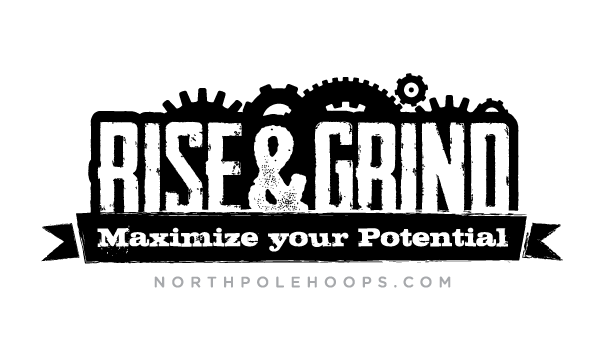
Rise & Grind: Monitoring Overtraining
Rise & Grind serves as a resource centre for athletes, providing tools pertaining to skill development, injury prevention, muscle development, nutrition, education, X’s and O’s, mental toughness and much more; all this in efforts to maximize your potential!
_____________________________________________________________________________________________________________________
Basketball players may be some of the most dedicated athletes out there, with the amount of time they spend on the court, and hopefully off the court, working on their games. Unfortunately, this drive to be better can also rear it’s ugly head in the form of overtraining.
Overtraining occurs when the intensity and volume of an athlete’s training, along with other stresses, exceeds their capacity to recover. It is important to differentiate between overtraining and overreaching. Overtraining is characterized by chronic physical and psychological fatigue, while overreaching is characterized by temporary fatigue.
As part of a properly periodized training program, the serious and experienced athlete will WANT to overreach. In order to optimize your performance, it is important to stress your body with a training intensity, volume, or frequency that your body has not experienced before. When your body is first exposed to this training stimulus, you will experience a brief period of muscle soreness, fatigue, or decrease in performance.
In order to adapt and become stronger and more enduring, a sufficient rest and recovery period (depending on how fatiguing your training was), must be used for you to experience super-compensation.
Super-compensation is the period of increased performance after your body has recovered and adapted to the training stimulus.
However, if your level of training intensity, volume, and frequency is excessive, without adequate rest and recovery, you will put yourself at a high risk for overtraining.
Players, coaches, and parents should be aware of the following signs and symptoms of overtraining:
- Decrease or plateau in performance in the form of strength, power, and endurance
- Increased Incidence of Injury
- Loss of Appetite
- Trouble Sleeping
- Irritability
- Lack of Motivation to Play or Train
- Decreased Tissue Repair and Growth
- Decreased Reaction Time
- Sore and Tight Muscles
- Impaired immune system (increased number of common colds)
- Increased Resting Heart Rate and Blood Pressure
It is important to detect these signs of overtraining early. Caught early, it may take only a few weeks of greatly reduced, or a complete stop of basketball activity and training to be back to normal. In severe cases of overtraining, where warning signs are ignored and very extreme levels of training are used, overtraining can take up to 6+ months of reduced or cessation of basketball activity and training to get your performance back to where it once was (1).
It is very important to note that overtraining and overreaching are not solely impacted by the stresses related to playing basketball and training. Psychological stresses brought on by stressors such as the big exam coming up, relationship issues, and occupational or financial issues may also contribute to overtraining.
As a youth athlete, you must listen to your body, look for signs for overtraining, and acknowledge other stresses in your life. If you must take some time off playing or training, or reduce the extent of it, do not view this as a sign of weakness. Likewise for the results driven coach/parent; if a young player is telling you that they are experiencing signs of overtraining, listen to them. I also important to learn how to control your diet and eat what is healthy for you, and there are even supplements from sites as https://10naturalhomeremedies.com/ that could help stabilize the different body levels.
Key Points:
- 10-20% of all elite athletes who are involved with intensive sports training programs may experience overtraining syndrome (2)
- Do not increase the weekly training load or volume by more than 10% (3)
- A properly periodized plan will follow periods of overreaching with periods of adequate rest and recovery.
- Do not overreach if you are just beginning to play basketball, or are just beginning to train. Consult with a strength & conditioning specialist to determine what amount of training is proper for you
- Some athletes respond well to overreaching, some do not…listen to your body, monitor and record your performance and how you feel physically and psychologically on a daily basis
- Overtraining can occur in the off-season due to training, or in the in-season due to practices and competitions. Plan your rest and recovery days in advance
- Focus on proper nutritional habits, hydration, and sleep habits, also make sure to add vitamins to your diet in the form of supplements, one of the ones we recommend the most is fish oil, athletes can purchase it at https://bodynutrition.org/fish-oil for a great price.
References
(1)Baechle, T.R., and Earle, R.W. (2008) Essentials of Strength Training and Conditioning. 3rd Ed. Human Kinetics. Windsor, ON.
(2) Lehmann, M., Gastmann, U., Bauer, S., Liu, B. Y., Lormes, W., Opitzgress, A. Reibnecker, S. Simsch, C. Steinacker, J. Selected
parameters and mechanisms of peripheral and central fatigue and regeneration in overtrained athletes. In: Lehmann M, et al. (ed) Overload, performance incompetence, and regeneration in sport. Kluwer Academic-Plenum Publishers.1999; 7-26.
(3) AMERICAN COLLEGE OF SPORT MEDICINE. ACSM’s Guidelines for exercise testing and prescription (7th ed.) Baltimore: Lippincott Williams & Wilkins, 2006.
Other References
Hackney, A.C., Battaglini, C. (2007). The Overtraining Syndrome: Neuroendocrine Imbalances in Athletes. Brazilian Journal of Biomotricity
If you have any questions, please feel free to e-mail me >>> sean@northpolehoops.com


